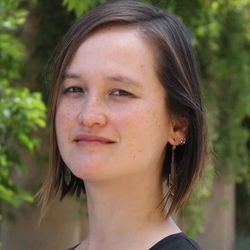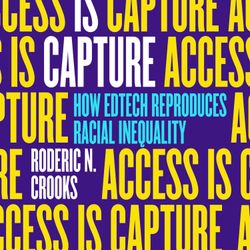Share

No Such Thing
Part 2: Kamau Bobb, Google's Global Lead for Diversity Strategy
A Keynote from the 2020 To Code and Beyond event at NY's Cornell Tech.
Kamau Bobb is a national authority in STEM education. He is the founding Senior Director of the Constellations Center for Equity in Computing at Georgia Tech. He is an engineer and science and technology policy scholar whose work focuses on the relationship between equity for students and communities of color in the STEM enterprise, large educational systems, and the social and structural conditions that influence contemporary American life.
He brings to his current position a wealth of experience as a former Program Officer at the National Science Foundation (NSF). At NSF he was responsible for $30 million annually of investments targeted on improving computing and STEM education. In that role, Bobb worked at the highest levels of the federal government to help shape the national research agenda for effective means of delivering equitable and quality computational education to all students. He has worked with members of the Office and Science and Technology Policy in the Obama Administration to set the national strategy for STEM education at both post-secondary and secondary school levels. He was selected as a member of President Obama’s My Brother’s Keeper STEM + Entrepreneurship Taskforce to help U.S. cities craft strategies to engage young men and boys of color in the STEM landscape.
Prior to his federal appointment, Bobb was the Director of the STEM Initiative for the University System of Georgia, a collaborative effort with the governor’s office to improve STEM education across the 30 public institutions serving approximately 325,000 students in the state. Bobb brings to STEM education a fierce commitment to equity as an indicator of justice. He has addressed and advised numerous leading tech sector companies, universities, and k-12 schools. His writing on STEM education and culture has been featured in The Atlantic, Black Enterprise, The Root, Edutopia and on the Obama White House Blog. His national and state leadership have contributed to a STEM education agenda that is more honest and reflective of contemporary social and cultural realities. Bobb holds a Ph.D. in Science and Technology Policy from Georgia Tech and M.S. and B.S. degrees in Mechanical Engineering from the University of California, Berkeley. He lives in Atlanta with his wife, Lisa, and daughter, Sadira.
Notes from the episode:
Register for CS4All NYC's Men of Color Lunch: https://cs4all.force.com/s/lt-event?id=a2af4000001BKiuAAG
Cornell Tech's K-12 Initiative: https://tech.cornell.edu/impact/k-12/
Kamau Bobb at SXSW Edu, 2019: https://youtu.be/ghnS4k3dCfg
Constellations Center for Equity in Computing at Georgia Tech: http://constellations.gatech.edu/people/kamau-bobb
More episodes
View all episodes

147. The Body Digital
43:27||Ep. 147Vanessa Chang builds communities and conversations about art, technology, people, and planet. She writes, curates, and teaches about new and old media, the history and philosophy of technology, design, disability and creative access, cities, comics, animation, circuses, and more. She is Director of Programs at Leonardo, the International Society for the Arts, Sciences, and Technology. She earned a Ph.D. in Modern Thought and Literature from Stanford University, where she was a Geballe Fellow at the Stanford Humanities Center and also ran the Graphic Narrative Project. She's also taught in Visual & Critical Studies at California College of the Arts and was lead curator with CODAME Art & Tech. She grew up in Singapore and Australia and is now based in San Francisco. Her first book, The Body Digital: A Brief History of Humans and Machines, from Cuckoo Clocks to ChatGPT, will be published on 4 November 2025.
146. The Case for Curiosity
56:14||Ep. 146Tinsley Galyean, Author of Reframe is a technologist, designer, and co-founder of Curious Learning, a global nonprofit dedicated to eradicating illiteracy. He holds a PhD from the MIT Media Lab and works at the intersection of education, storytelling, and digital innovation, creating interactive experiences for museums and programing for networks like Discovery Kids, Disney, and Warner Bros.Under Galyean’s leadership, Curious Learning has made its literacy apps available in 60 languages, reaching children in diverse communities worldwide, many with little or no access to formal schooling. By partnering with parents, educators, NGOs, and governments, the organization has helped children in some of the most resource-constrained settings begin their reading journey. Curious Learning’s work is recognized for its commitment to mother-tongue instruction and its focus on data-driven evaluation to ensure real, lasting impact.LInks:https://www.businessexpertpress.com/books/reframe-how-curiosity-and-literacy-can-redefine-us/https://www.curiouslearning.org/https://medium.com/authority-magazine/high-impact-philanthropy-tinsley-galyean-of-curious-learning-on-how-to-leave-a-lasting-legacy-with-1c9b04d7b6fc
145. If Everyone Is a Power User: Matt Dalio on Democratizing Technology
01:00:08||Ep. 145Matt Dalio is the founder of Endless, a visionary initiative dedicated to empowering youth to become creators of technology rather than passive consumers. His work spans three pillars: Endless Studios, a youth game-making studio; Endless Access, which tackles device affordability and connectivity; and Endless OS, an education-focused operating system designed to teach coding and digital skills through games.Matt’s journey began with formative experiences in China, where he founded the China Care Foundation as a teenager to support orphans—an early signal of his lifelong commitment to equity and empowerment. He’s also the son of Ray Dalio, founder of Bridgewater Associates, and credits his father’s ethos of purpose-driven work as a guiding influence, while forging his own path in education and technology.In 2024, Matt announced a major partnership with Arizona State University to launch the Endless Games and Learning Lab, a $5M initiative aimed at scaling personalized, game-based learning for millions of students worldwide.Links:Media Kit / Bio:https://kitcaster.com/matt-dalio/Social:https://www.linkedin.com/in/mattdalio/Website:https://www.endlessstudios.com/
144. Greedy Algorithms, Public Goods: Rethinking AI Regulation and Education
58:52||Ep. 144Dr. Julia Stoyanovich is Institute Associate Professor of Computer Science and Engineering, Associate Professor of Data Science, Director of the Center for Responsible AI, and member of the Visualization and Data Analytics Research Center at New York University. She is a recipient of the Presidential Early Career Award for Scientists and Engineers (PECASE) and a Senior member of the Association of Computing Machinery (ACM). Julia’s goal is to make “Responsible AI” synonymous with “AI”. She works towards this goal by engaging in academic research, education and technology policy, and by speaking about the benefits and harms of AI to practitioners and members of the public. Julia’s research interests include AI ethics and legal compliance, and data management and AI systems. Julia is engaged in technology policy and regulation in the US and internationally, having served on the New York City Automated Decision Systems Task Force, by mayoral appointment, among other roles. She received her M.S. and Ph.D. degrees in Computer Science from Columbia University, and a B.S. in Computer Science and in Mathematics & Statistics from the University of Massachusetts at Amherst.Links:https://engineering.nyu.edu/faculty/julia-stoyanovich https://airesponsibly.net/nyaiexchange_2025/
143. Debugging Efforts in CS Education
01:00:29||Ep. 143Guest Diane Levitt shares how Cornell Tech, in collaboration with the City of New York, is reimagining computer science education through an equity-first approach. From pilot programs that stumble to systems that scale, this episode explores how institutional iteration—especially when it fails—can lead to more inclusive and impactful CS learning.Links:https://www.prnewswire.com/news-releases/2024-state-of-computer-science-education-highlights-growing-investment-from-policymakers-continued-gaps-in-access-302282502.htmledc.nyc/press-release/nycedc-and-cornell-tech-advance-new-new-york-initiative-establish-new-york-cityedc.nyc/program/pilot-new-york-citypar.nsf.gov/servlets/purl/10101543https://tech.cornell.edu/about/https://www.linkedin.com/feed/update/urn:li:activity:7344464344660811780/https://csteachers.org/what-is-the-state-of-cs-education-in-2024/
142. The Data Beyond Seat Time
45:38||Ep. 142In this episode of No Such Thing, I talk with Laura Slover, Managing Director of the Skills for the Future initiative—a joint effort by ETS and the Carnegie Foundation. We explore what it means to move beyond the century-old Carnegie Unit and toward a system that captures the full spectrum of what learners know and can do.From internships to outdoor leadership, from dashboards to transcripts that actually reflect growth—this conversation is for anyone thinking about how we build a more human, equitable, and future-ready education system.Links:Sasha Bruce Youthwork https://www.sashabruce.org/https://aschoolwithoutwalls.org/https://www.hightechhigh.org/ETS's official Skills for the Future page – This outlines the initiative’s goals, including competency-based learning and skill recognition, backed by ETS’s expertise in educational measurement.Carnegie Foundation’s Skills for the Future initiative – A deep dive into how the program is shifting education from time-based to competency-based learning, with a focus on essential skills beyond traditional academics.Indiana State Board of Education report – A detailed research paper discussing the transition from time-based education models to skill-based insights, highlighting the empirical evidence supporting this shift.Explainer on modern skills-based assessment – A paper from Carnegie Foundation discussing the limitations of traditional assessments and how Skills for the Future is innovating measurement techniques.ETS & Carnegie’s framework for durable skills – A breakdown of the essential skills identified for success across life domains, emphasizing developmental skill progressions and personalized learning.https://www.carnegiefoundation.org/resources/publications/carnegie-unit/https://eric.ed.gov/?id=EJ1057177https://nces.ed.gov/fastfacts/display.asp?id=38https://www.nagb.gov/news-and-events/news-releases/2025/nations-report-card-decline-in-reading-progress-in-math.htmlhttps://christophegaron.com/articles/mind/how-do-kids-change-during-the-summer-insights-on-summer-growth-in-children/https://www.tulsakids.com/brains-on-break/
141. Can Simulation Train Equitable Teaching?
52:53||Ep. 141Exploring how simulations are shaping education research and practice, with insights from the book Promoting Equity through Approximations of Practice in Mathematics Education. It examines how approximations of practice can help educators sharpen their skills while keeping equity at the forefront. It’s not just about improving instruction; it’s about ensuring that all students, regardless of background, have access to high-quality learning experiences.Links:Lee, C., Bondurant, L., Sapkota, B., Howell, H. (2025). Promoting equity in approximations of practice for mathematics teachers. IGI Global. https://doi.org/10.4018/979-8-3693-1164-6Benoit, G., Barno, E., & Reich, J. (2025). Simulating Equitable Discussions Using Practice-Based Teacher Education in Math Professional Learning. In C. Wilkerson Lee, L. Bondurant, B. Sapkota, & H. Howell (Eds.), Promoting Equity in Approximations of Practice for Mathematics Teachers (pp. 165-200). IGI Global Scientific Publishing. https://doi.org/10.4018/979-8-3693-1164-6.ch008 Shaughnessy, M., Boerst, T. A., Garcia, N., & Claiborne, B. (2025). Orienting to Student Sense-Making: Using Simulations to Support the Development of Equitable Mathematics Teaching. In C. Wilkerson Lee, L. Bondurant, B. Sapkota, & H. Howell (Eds.), Promoting Equity in Approximations of Practice for Mathematics Teachers (pp. 253-276). IGI Global Scientific Publishing. https://doi.org/10.4018/979-8-3693-1164-6.ch011 Howell, H., Shaughnessy, M., Stengel, B., Lee, C., Bondurant, L., Sapkota, B., Benoit, G., & Lai, Y. (2025). Editorial insights: Reflections on the volume and charge to the field. In C. Lee, L. Bondurant, B. Sapkota, & H. Howell (Eds.), Promoting equity in approximations of practice for mathematics teachers (pp. 395-414). IGI Global. https://doi.org/10.4018/979-8-3693-1164-6.ch017Ataide Pinheiro, W., Kaur Bharaj, P., Cross Francis, D., Kirkpatrick Darwin, T., Esquibel, J., & Halder, S. (2025). An Investigation of Gender Biases in Teacher-Student Interaction in Mathematics Lessons Within a Virtual Teaching Simulator. In C. Wilkerson Lee, L. Bondurant, B. Sapkota, & H. Howell (Eds.), Promoting Equity in Approximations of Practice for Mathematics Teachers (pp. 201-228). IGI Global Scientific Publishing. https://doi.org/10.4018/979-8-3693-1164-6.ch009 MIT’s Teacher Moments digital simulation platform: https://teachermoments.mit.edu/ Becoming a More Equitable Educator https://openlearninglibrary.mit.edu/courses/course-v1:MITx+0.503x+T2020/about Reich, J. (2022). Teaching drills: Advancing practice-based teacher education through short, low-stakes, high-frequency practice. Journal of Technology and Teacher Education, 30(2), 217-228. https://doi.org/10.70725/023707spaywm Bima’s lit review: https://doi.org/10.1080/14794802.2023.2207088
140. The Movement for Digital Wellness
57:58||Ep. 140For decades, the conversation around youth and technology has been dominated by powerful voices—media, researchers, and word-of-mouth warnings—painting a picture of digital tools as the looming threat to young people’s well-being. But what if that narrative isn’t the whole story? What if, instead, we favored the spectrum of possibilities in the digital present and future, instead of a good or evil binary. It would take a a vibrant counter-movement, led by passionate advocates and young people themselves, determined to reclaim the digital world for good. And good news, there is one.This episode was recorded live at Sesame Workshop, bringing together a true who's who of leaders and do-ers in the world of “Digital Wellness for Young People.” At the heart of our conversation is Young Futures—a startup initiative funding projects through the crucial lens of digital wellness. Young Futures is empowering the next generation to create, innovate, and advocate for a healthier digital landscape, supporting ideas that prioritize well-being over profit.Joining us are visionaries from the Scratch Foundation, the organization behind the world’s largest free creative coding platform for kids, empowering millions to express themselves and solve problems through technology. We’re also honored to welcome leaders from the Joan Ganz Cooney Center, a research and innovation lab that advances learning in a digital age, inspired by the pioneering spirit of Sesame Street.Links:https://www.youngfutures.org/https://joanganzcooneycenter.org/initiative/ritec/https://www.scratchfoundation.org/https://joanganzcooneycenter.org/initiative/well-being-by-design-fellowship/https://www.gamesforchange.org/
139. Access is Capture: How Edtech Reproduces Racial Inequality
01:01:23||Ep. 139Roderic Crooks is an associate professor in the Department of Informatics at the University of California, Irvine. His research examines how the use of digital technology by public institutions contributes to the minoritization of working-class communities of color. His current project explores how community organizers in working-class communities of color use data for activist projects, even as they dispute the proliferation of data-intensive technologies in education, law enforcement, financial services, and other vital sites of public life. He has published extensively in HCI, STS, and social science venues on topics including political theories of online participation, equity of access to information and media technologies, and document theory. He is the author Access Is Capture: How Edtech Reproduces Racial Inequality, published in 2024 by the University of California Press (https://www.ucpress.edu/books/access-is-capture/paper). Access is Capture Racially and economically segregated schools across the United States have hosted many interventions from commercial digital education technology (edtech) companies who promise their products will rectify the failures of public education. Edtech's benefits are not only trumpeted by industry promoters and evangelists but also vigorously pursued by experts, educators, students, and teachers. Why, then, has edtech yet to make good on its promises? In Access Is Capture, Roderic N. Crooks investigates how edtech functions in Los Angeles public schools that exclusively serve Latinx and Black communities. These so-called urban schools are sites of intense, ongoing technological transformation, where the tantalizing possibilities of access to computing meet the realities of structural inequality. Crooks shows how data-intensive edtech delivers value to privileged individuals and commercial organizations but never to the communities that hope to share in the benefits. He persuasively argues that data-drivenness ultimately enjoins the public to participate in a racial project marked by the extraction of capital from minoritized communities to enrich the tech sector.Links:Amazon listing for Access Is CaptureUniversity of California Press page for Access Is CaptureAuthor's personal websiteTalks and events from Civics of Technology featuring Roderic N. CrooksArticle co-authored by Crooks discussing intersectional themes in feminist formations